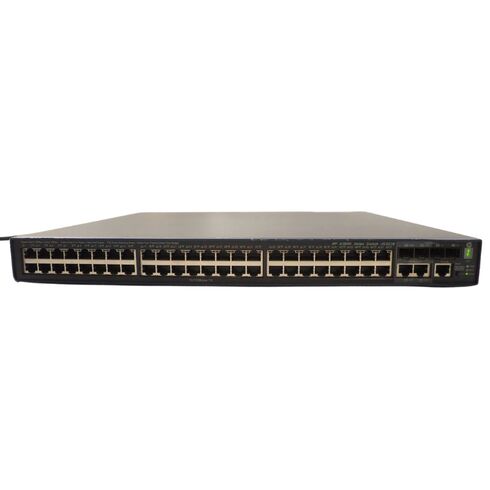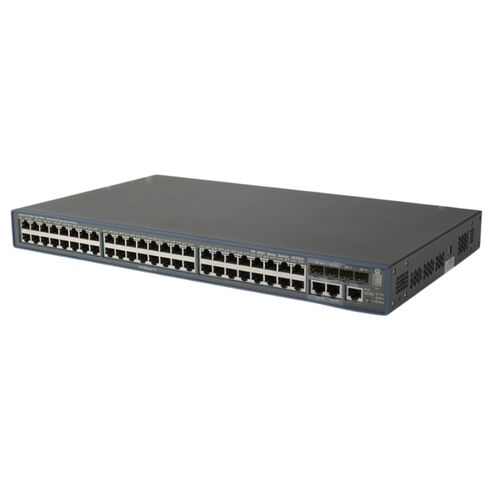JG300A HPE V2 Network Switches, L4 Managed, 4 Gigabit SFP Ports, 2 Shared 10/100/1000 Ports
- — Free Ground Shipping
- — Min. 6-month Replacement Warranty
- — Genuine/Authentic Products
- — Easy Return and Exchange
- — Different Payment Methods
- — Best Price
- — We Guarantee Price Matching
- — Tax-Exempt Facilities
- — 24/7 Live Chat, Phone Support
- — Visa, MasterCard, Discover, and Amex
- — JCB, Diners Club, UnionPay
- — PayPal, ACH/Bank Transfer (11% Off)
- — Apple Pay, Amazon Pay, Google Pay
- — Buy Now, Pay Later - Affirm, Afterpay
- — GOV/EDU/Institutions PO's Accepted
- — Invoices
- — Deliver Anywhere
- — Express Delivery in the USA and Worldwide
- — Ship to -APO -FPO
- — For USA - Free Ground Shipping
- — Worldwide - from $30
Product Overview of HPE JG300A 3600-48 V2 Switch
Product Details
- Manufacturer: HPE
- Model Number: JG300A
- Device Type: Managed Layer 4 Switch
- Form Factor: 1U Rack-Mountable
Port Configuration and Connectivity
- Primary Ports: 48 x 10/100 Mbps Ethernet
- Gigabit Uplinks: 4 x SFP and 2 shared 10/100/1000 Mbps ports
- Console Access: 1 x RJ-45 serial port
Performance Specifications
- Throughput: 13.1 Mpps
- Routing/ Switching Capacity: 17.6 Gbps
- Jumbo Frame Support: Up to 9216 bytes
Protocol Support
Routing Protocols
- Static IPv4 and IPv6 routing
- OSPF, RIP, BGP-4+, and more
- Multicast support: IGMPv2, IGMPv3, PIM-SM, PIM-DM
Remote Management
- SNMP (v1, v2c, v3), RMON (1, 2, 3, 9)
- HTTP, HTTPS, CLI, Telnet
- Secure Management via SSH and SSL
Key Features for Modern Networking
Layer 2 and Layer 3 Capabilities
- VLAN and ARP support
- Dynamic Host Configuration Protocol (DHCP)
- Spanning Tree Protocol (STP), RSTP, MSTP
Enhanced Network Reliability
- VRRP, RRPP, and BFD for redundancy
- Endpoint Admission Defense (EAD)
- Auto-uplink with MDI/MDI-X
Compliant Standards and Certifications
- IEEE 802.3, 802.3u, 802.3z for Ethernet standards
- 802.1Q VLAN tagging
- 802.1x network access control
- Quality of Service (QoS) and ACL support
Hardware Specifications
- RAM: 256 MB SDRAM
- Flash Memory: 128 MB
Expandability
- 48 x RJ-45 (10/100 Mbps)
- 4 x SFP (Mini-GBIC)
- 2 x RJ-45 (10/100/1000 Mbps shared)
Managed Feature - L4
Introduction to the Managed Feature
The HPE JG300A Network Switches come equipped with a powerful managed feature that provides users with advanced control and configuration options. One of the standout capabilities of this feature is the support for Layer 4 (L4) functionality, which offers numerous benefits for network administrators and users alike.
Understanding Layer 4 Functionality
Layer 4 refers to the transport layer in the Open Systems Interconnection (OSI) model, which is responsible for managing end-to-end communication between network devices. By incorporating L4 functionality into the HPE JG300A Network Switches, users gain enhanced control over their network traffic, enabling them to optimize performance and improve security.
1. Quality of Service (QoS)
One of the significant advantages of the L4 feature is its ability to prioritize network traffic using Quality of Service (QoS) mechanisms. With QoS, network administrators can assign different levels of priority to specific applications or data streams, ensuring that critical traffic receives preferential treatment. This allows for better allocation of network resources and prevents congestion, resulting in improved overall network performance.
2. Traffic Shaping
Leveraging L4 functionality, the HPE JG300A Network Switches enable traffic shaping capabilities. Traffic shaping allows administrators to regulate and control the flow of network traffic based on predefined policies. By setting bandwidth limits for different types of traffic, such as video streaming or file transfers, administrators can ensure that no single application monopolizes the available resources. This helps maintain a consistent user experience across the network and prevents any particular service from negatively impacting others.
3. Load Balancing
Another significant benefit of the managed L4 feature is its support for load balancing. Load balancing distributes network traffic across multiple paths or devices, ensuring optimal utilization of resources and preventing any single device from becoming overwhelmed. By intelligently distributing incoming requests, load balancing improves network efficiency, minimizes response times, and enhances overall reliability. This is particularly crucial in environments where high availability and scalability are essential.
4. Firewall Protection
Incorporating L4 functionality into the HPE JG300A Network Switches also enhances their firewall capabilities. With L4 firewall protection, users can create rules and policies based on specific transport layer attributes, such as source/destination ports or protocols. This allows administrators to finely tune access control and secure the network against potential threats, preventing unauthorized access or malicious activities.
5. Network Segmentation
The managed L4 feature further facilitates network segmentation, enabling administrators to divide their network into logical segments or VLANs (Virtual Local Area Networks). By segmenting the network, organizations can isolate different departments, user groups, or sensitive data, enhancing security and improving overall network performance. This separation also allows for more efficient management and troubleshooting of network issues.
Ports Feature - 4, 2
Introduction to the Ports Feature
The HPE JG300A Network Switches offer a comprehensive range of ports to accommodate various connectivity requirements. With 4 ports for data transmission and 2 ports dedicated to uplink connections, these switches ensure seamless communication between devices while providing the flexibility needed for expanding network infrastructures.
Benefits of Multiple Data Transmission Ports
The inclusion of 4 data transmission ports in the HPE JG300A Network Switches offers several advantages for users.
1. Increased Device Connectivity
With four data transmission ports, users have the flexibility to connect multiple devices simultaneously. This allows for efficient networking in environments where numerous devices, such as computers, servers, printers, or IP cameras, need to be interconnected. The increased device connectivity ensures smooth data flow and minimizes bottlenecks, ultimately enhancing productivity and user experience.
2. Enhanced Network Performance
The availability of multiple data transmission ports enables load balancing and link aggregation capabilities. Load balancing distributes network traffic across multiple ports, preventing any single port from becoming overwhelmed and ensuring optimal utilization of available bandwidth. Link aggregation, also known as port trunking or bonding, combines multiple ports into a single logical link, increasing overall throughput and improving network performance. These features enhance network efficiency and reduce latency, resulting in faster data transfers and improved application responsiveness.
3. VLAN Support
The 4 data transmission ports on the HPE JG300A Network Switches also support Virtual Local Area Networks (VLANs). VLANs enable administrators to logically segment the network into distinct groups, enhancing security and facilitating better management. By assigning different ports to specific VLANs, administrators can control access to resources and isolate traffic between different user groups or departments. This flexibility simplifies network administration while ensuring data integrity and confidentiality.
Benefits of Uplink Ports
In addition to the data transmission ports, the HPE JG300A Network Switches feature 2 uplink ports specifically designed for connecting to other network devices or uplinking to higher-level switches or routers.
1. Expandability and Scalability
The presence of uplink ports allows organizations to expand their network infrastructure without replacing the existing switches. By connecting the HPE JG300A Network Switches to higher-level switches or routers using these uplink ports, users can seamlessly extend their network capacity and accommodate additional devices or subnetworks. This scalability ensures that the switches can adapt to evolving business needs without causing disruptions or requiring major investments.
2. Redundancy and High Availability
The use of uplink ports also facilitates redundancy and high availability in network designs. By connecting the HPE JG300A Network Switches to multiple higher-level switches or routers, organizations can establish redundant paths for data transmission. In case of a link failure, the switches can automatically switch to an alternate path, minimizing downtime and ensuring continuous network operation. This redundancy enhances network reliability and fault tolerance, critical factors for businesses that rely heavily on uninterrupted connectivity.
Conclusion
The HPE JG300A Network Switches offer a robust managed feature with L4 functionality, providing users with advanced control over their network traffic. The support for Layer 4 enables Quality of Service, traffic shaping, load balancing, firewall protection, and network segmentation, enhancing network performance, security, and manageability.
Additionally, the switches boast 4 data transmission ports and 2 uplink ports. The multiple data transmission ports facilitate increased device connectivity, enhanced network performance through load balancing and link aggregation, and support for VLANs. The uplink ports enable expandability, scalability, redundancy, and high availability in network designs.
With these features and capabilities, the HPE JG300A Network Switches are an ideal choice for organizations seeking reliable, flexible, and secure networking solutions.











